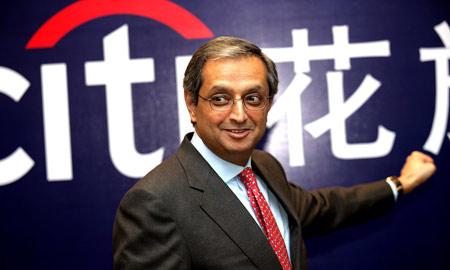 Vikram Pandit Citigroup Chief Executive Vikram Pandit said yesterday that the bank would continue to expand its presence in China, reflecting the banking major's commitment to growth in emerging markets.
Vikram Pandit Citigroup Chief Executive Vikram Pandit said yesterday that the bank would continue to expand its presence in China, reflecting the banking major's commitment to growth in emerging markets. "There is no doubt that China is critically important to Citi and our long-term growth ambitions, and it still remains a priority market for us," Pandit told China Daily in Beijing.
The remarks came after the bank said yesterday it got the regulatory approval for a new branch in Guiyang, Guizhou province.
The new branch is expected to open in the first half of this year and would expand Citi's network in the country to 10 cities.
"We are committed to pursuing growth across multiple lines of business in China, and the new branch reflects our intent to expand in the country this year and beyond," said Pandit.
Apart from the retail banking franchise, the bank is also exploring ways to expand its presence in the securities market, he said.
"We are actively looking for a local partner to develop our securities business arm in the country," he said, without elaborating on prospective partnerships with local brokerages.
Stephen Bird, chief executive officer of Citi Asia-Pacific, said that the bank would continue its investments in China despite the difficult global environment.
Last year, the bank opened two lending companies in Hubei and Liaoning provinces.
"We see the need in some of the smaller cities and towns, where customers are largely underserved. The lending company model could channel the savings from cities to regions where lending is needed," Andrew Au, chief executive of Ctiti China, said.
With Citi's business on its home turf still weak, Asia has become an important revenue stream for the bank. The bank recently unveiled a series of moves to enhance its presence in other core markets like Japan and Hong Kong.
The bank opened six more full service retail branches in Hong Kong on Wednesday and plans to launch four smart banking retail branches in Japan this year.
The Japanese expansion is considered significant as it signals a shift from its strategy of selling assets in the region last year.
Citi is also in the process of disposing of its non-core businesses. Pandit expects the capital released from these divestitures to be reinvested in its core businesses.
The New York-based banking giant, which is still 27 percent owned by the US government after repaying $20 billion federal bailout fund in January, posted a loss of $1.6 billion in 2009. That compares to the $27.7 billion it reported in 2008, when the crisis was at its worst.
"Sustained profitability is our primary goal. We believe that we are well-positioned for that, but the credit issue in the US is something we would be watching carefully," Pandit said.
Pandit said that Citi's presence in more than 109 countries and regions across the world differentiates it from other players in the market and it expects international money transfer for corporates to be its mainstay.
"We move about $3 trillion a day around the world for our clients, and sometimes that number could reach as much as $9 trillion a day," he said.





